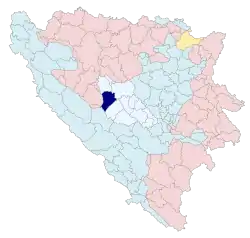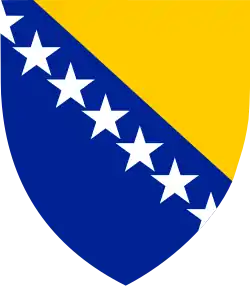Donji Vakuf
Donji Vakuf (Serbian Cyrillic: Доњи Вакуф, pronounced [dɔ̂ːɲiː vǎkuf]) is a town and municipality located in Central Bosnia Canton of the Federation of Bosnia and Herzegovina, an entity of Bosnia and Herzegovina.
Donji Vakuf
Доњи Вакуф | |
|---|---|
Town and municipality | |
 | |
 Location of Donji Vakuf within Bosnia and Herzegovina. | |
| Coordinates: 44°09′N 17°24′E | |
| Country | |
| Entity | Federation of Bosnia and Herzegovina |
| Government | |
| • Municipality president | Huso Sušić (Ind.) |
| Area | |
| • Total | 320 km2 (120 sq mi) |
| Population (2013 census) | |
| • Total | 13,985 |
| • Density | 46/km2 (120/sq mi) |
| Time zone | UTC+1 (CET) |
| • Summer (DST) | UTC+2 (CEST) |
| Area code(s) | +387 30 |
| Website | www |
It was founded by Malkoçoğlu İbrahim Bey in 1572 and was known as "Aşağı Vakıf" ("lower foundation" in Turkish). Donji Vakuf is the Bosnian translation of "Aşağı Vakıf".
Settlements
- Babin Potok
- Babino Selo
- Barice
- Blagaj
- Brda
- Brdo
- Brezičani
- Ćehajići
- Ćemalovići
- Daljan
- Dobro Brdo
- Doganovci
- Dolovi
- Donji Rasavci
- Donji Vakuf
- Đulovići
- Fakići
- Fonjge
- Galešići
- Grabantići
- Gredina
- Grič
- Guvna
- Hemići
- Jablan
- Jemanlići
- Karići
- Keže
- Komar
- Korenići
- Košćani
- Kovačevići
- Krivače
- Kutanja
- Ljuša
- Makitani
- Novo Selo
- Oborci
- Orahovljani
- Petkovići
- Piljužići
- Pobrđani
- Ponjavići
- Potkraj
- Pribraća
- Prisika
- Prusac
- Rasavci
- Rastičevo
- Rudina
- Ruska Pilana
- Sandžak
- Semin
- Silajdževina
- Slatina
- Sokolina
- Staro Selo
- Suhodol
- Sultanovići
- Suljići
- Šahmani
- Rahmani
- Šeherdžik
- Šutkovići
- Torlakovac
- Urija
- Vlađevići
- Vrljaj
History
From 1929 to 1941, Donji Vakuf was part of the Vrbas Banovina of the Kingdom of Yugoslavia.
Demographics
Population
| Population of settlements – Donji Vakuf municipality | ||||||
|---|---|---|---|---|---|---|
| Settlement | 1961. | 1971. | 1981. | 1991. | 2013. | |
| Total | 16,036 | 20,393 | 22,606 | 24,544 | 13,985 | |
| 1 | Ćehajići | 321 | 311 | |||
| 2 | Daljan | 160 | 236 | |||
| 3 | Donji Rasavci | 339 | 204 | |||
| 4 | Donji Vakuf | 5,012 | 7,224 | 8,771 | 6,711 | |
| 5 | Jemanlići | 337 | 209 | |||
| 6 | Kutanja | 433 | 310 | |||
| 7 | Oborci | 652 | 607 | |||
| 8 | Ponjavići | 285 | 331 | |||
| 9 | Pribraća | 715 | 426 | |||
| 10 | Prusac | 1,756 | 1,281 | |||
| 11 | Šeherdžik | 344 | 261 | |||
| 12 | Torlakovac | 766 | 592 | |||
Ethnic composition
| Ethnic composition – Donji Vakuf town | |||||||
|---|---|---|---|---|---|---|---|
| 2013. | 1991. | 1981. | 1971. | ||||
| Total | 6,711 (100,0%) | 8,771 (100,0%) | 7,224 (100,0%) | 5,012 (100,0%) | |||
| Bosniaks | 6,360 (94,77%) | 5,327 (60,73%) | 4,207 (58,24%) | 3,723 (74,28%) | |||
| Others | 276 (4,113%) | 114 (1,300%) | 58 (0,803%) | 20 (0,399%) | |||
| Serbs | 56 (0,834%) | 2,616 (29,83%) | 1,854 (25,66%) | 882 (17,60%) | |||
| Croats | 19 (0,283%) | 191 (2,178%) | 184 (2,547%) | 278 (5,547%) | |||
| Yugoslavs | 523 (5,963%) | 900 (12,46%) | 84 (1,676%) | ||||
| Montenegrins | 12 (0,166%) | 5 (0,100%) | |||||
| Slovenes | 5 (0,069%) | 3 (0,060%) | |||||
| Albanians | 2 (0,028%) | 17 (0,339%) | |||||
| Macedonians | 1 (0,014%) | ||||||
| Hungarians | 1 (0,014%) | ||||||
| Ethnic composition – Donji Vakuf municipality | ||||||||
|---|---|---|---|---|---|---|---|---|
| 2013. | 1991. | 1981. | 1971. | 1961. | ||||
| Total | 13,985 (100,0%) | 24,544 (100,0%) | 22,606 (100,0%) | 20,393 (100,0%) | 16,036 (100,0%) | |||
| Bosniaks | 13,376 (95,65%) | 13,509 (55,04%) | 11,600 (51,31%) | 10,528 (51,63%) | 6,289 (39.22%) | |||
| Others | 444 (3,175%) | 227 (0,925%) | 177 (0,783%) | 49 (0,240%) | 51 (0.32%) | |||
| Serbs | 107 (0,765%) | 9,533 (38,84%) | 8,574 (37,93%) | 8,767 (42,99%) | 7,870 (49.08%) | |||
| Croats | 58 (0,415%) | 682 (2,779%) | 635 (2,809%) | 924 (4,531%) | 976 (6.09%) | |||
| Yugoslavs | 593 (2,416%) | 1 592 (7,042%) | 90 (0,441%) | 850 (5.30%) | ||||
| Montenegrins | 18 (0,080%) | 12 (0,059%) | ||||||
| Slovenes | 5 (0,022%) | 3 (0,015%) | ||||||
| Macedonians | 2 (0,009%) | |||||||
| Albanians | 2 (0,009%) | 19 (0,093%) | ||||||
| Hungarians | 1 (0,004%) | 1 (0,005%) | ||||||
Tourism
The village of Prusac lies just outside Donji Vakuf. Bosniaks make a pilgrimage to the nearby holy site of Ajvatovica in June. It is one of the biggest events in the whole of Bosnia.
References
This article is issued from Wikipedia. The text is licensed under Creative Commons - Attribution - Sharealike. Additional terms may apply for the media files.
